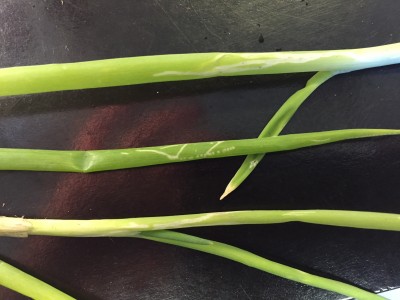Allium Leafminer Spring Flight Has Begun
Ethan Grundberg, Vegetable Specialist
Eastern New York Commercial Horticulture

On Friday, April 27th, Teresa Rusinek confirmed the first signs of adult allium leafminer (ALM) activity on garlic in Ulster County. We anticipate adults will continue to mate and lay eggs on allium crops through the month of May. As the larvae feed on tissue inside of the leaf, they can cause considerable damage to crops like scallions and chives that are marketed with green tops. The physical damage caused by adult oviposition and larval feeding also opens wounds in the leaf tissue that can serve as entry points for other pathogens that cause botrytis leaf blight and soft rot.
We are conducting insecticide efficacy trials this year in conjunction with Cornell entomologist Dr. Brian Nault to better understand which active ingredients are most effective at reducing damage from ALM and also how many applications are necessary for acceptable ALM control. There are a number of insecticides labeled for leafminer control on bulb vegetables: the insect growth regulator cyromazine (Trigard), spinosyns (Radiant, Entrust (OMRI)), and several pyrethroids (Mustang Maxx, Warrior). Note that abamectin products (Agri-Mek), neonicotinoids (Assail, Admire Pro), and cyantraniliprole formulations (Exirel) are labeled ONLY for Liriomyza leafminers and/or thrips, but may be effective at managing ALM. Since allium species have a waxy leaf cuticle, it is highly recommended that insecticides be mixed with a compatible penetrating adjuvant (LI 700, M-Pede (OMRI), etc.) As always, follow the labeled directions for use for any pesticide.
This article is from the May 3, 2018 edition of ENYCHP Vegetable News. To read the full newsletter,CLICK HERE.

Upcoming Events
Wine Sensory Evaluation Workshop
April 26, 2024 : Wine Sensory Evaluation Workshop
Staatsburg, NY
In collaboration with Jeremy Schuster, Viticulture Specialist at the ENYCHP, Dr. Anna Katharine Mansfield and Chris Gerling, Enology Extension Specialists with the Cornell Craft Beverage Institute, will be presenting a wine production-focused, interactive workshop on sensory evaluation.












































